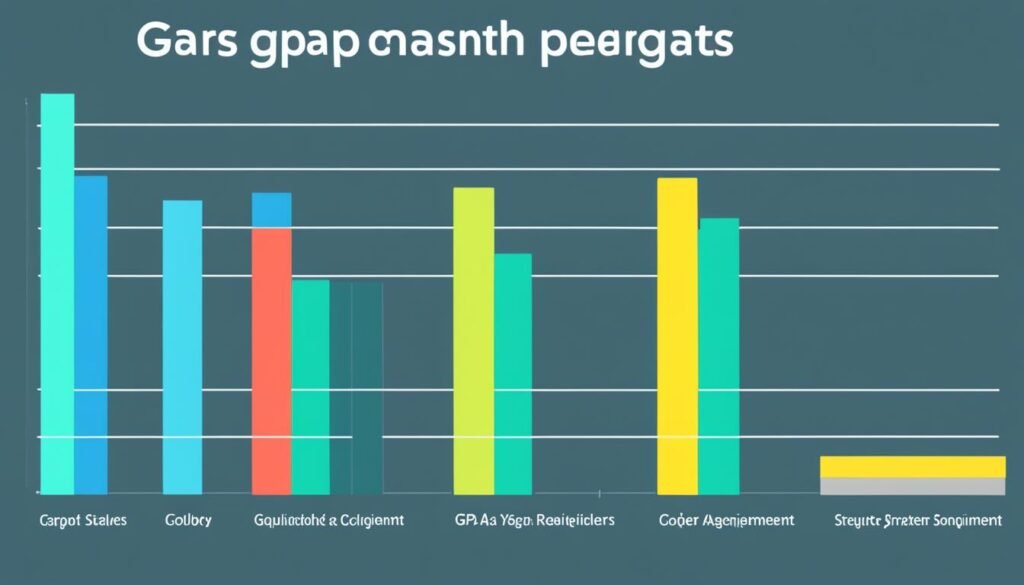Worried about your chances of getting into graduate school because your GPA is low? Don’t worry, having a less-than-perfect GPA doesn’t have to be a deal-breaker for pursuing a Master’s degree. The importance of GPA varies across different graduate programs, with some placing more emphasis on other factors such as your statement of purpose, recommendation letters, and relevant experience. It’s essential to research the specific requirements of the programs you’re interested in to understand how they consider GPAs during the admissions process.
Key Takeaways:
- A low GPA should not deter you from applying to graduate school.
- Research the specific requirements of the programs you’re interested in to understand how they consider GPAs.
- Programs may prioritize other factors like your statement of purpose, recommendation letters, and relevant experience.
- Consider taking additional coursework or gaining field experience to strengthen your application.
- Faculty guidance and strong recommendation letters can also help mitigate a low GPA.
The Significance of GPA in Graduate School Admissions
When applying to graduate school, one of the critical components of your application is your undergraduate GPA. Graduate school admissions committees often require transcripts as proof that you have earned an undergraduate degree and to evaluate your academic achievements. However, it’s essential to note that GPA is not the sole determinant in the admissions process.
Graduate schools take a holistic approach when assessing applications. They consider various factors, including your statement of purpose, letters of recommendation, standardized test scores (e.g., GRE), and samples of your past work. These components provide insights into your potential as a graduate student and your suitability for the program.
While some graduate programs place a high emphasis on GPA, others may prioritize other aspects such as coursework performance, portfolio, experience, or specific program-related requirements. The admissions committee takes into account your overall academic performance and considers how well you meet their program’s standards and objectives.
Having a strong undergraduate GPA can demonstrate your ability to succeed academically and may reflect your dedication and commitment to your studies. However, a lower GPA does not necessarily disqualify you from being admitted to graduate school. It is crucial to remember that GPA is just one piece of the application puzzle, and other factors can offset a less-than-perfect GPA.
In the following sections, we will explore different strategies you can employ to enhance your application and compensate for a lower GPA, ultimately increasing your chances of gaining admission to your desired graduate program.
Researching GPA Requirements for Graduate Programs
When considering applying to graduate school, it is crucial to thoroughly research the GPA requirements of the programs you are interested in. Each graduate program has its own specific GPA requirements, and understanding these requirements is essential for assessing your chances of admission.
To start your research, visit the websites of the graduate programs you are considering. Look for information on the minimum GPA requirements and average GPA scores of past successful applicants. These details will give you a clearer picture of how your GPA compares to the expectations of each program.
As you gather information, it is recommended to categorize the programs into three groups: safety schools, solid schools, and dream schools. Safety schools are those with higher admission chances, where your GPA meets or exceeds the minimum requirement. Solid schools are those where your GPA is within the average range of admitted students. Dream schools are highly competitive programs where your GPA may be below the average, but you may still have other strengths to compensate.
Assessing how your GPA fits into the requirements of each program will help you determine your overall chances of admission. If your GPA seems lower than the requirements of a particular program, do not be discouraged. There are various strategies you can employ to strengthen your application and potentially mitigate the impact of a lower GPA.

Seeking Faculty Guidance for Low GPA Applications
If you have a low GPA, don’t despair. There are steps you can take to improve your chances of getting into graduate school. One crucial resource you can tap into is faculty advice. Faculty members from the program you’re interested in can provide valuable insights and guidance to help mitigate the impact of your low GPA.
When scheduling appointments with faculty members, be prepared to discuss your interest in the program, your qualifications, and any mitigating circumstances that may have affected your GPA. Faculty members are well aware that there are various factors that can contribute to a low GPA, such as personal setbacks or challenging life circumstances.
During your meetings with faculty members, they can offer guidance on how your application may be viewed given your GPA and provide recommendations on how to strengthen your application. They may suggest taking additional coursework to demonstrate your knowledge and commitment to academic success. Taking relevant coursework can serve as evidence of your ability to thrive in the program despite your GPA.
Furthermore, faculty members might recommend pursuing relevant field experience to showcase your skills and passion for the field. This could include internships, research opportunities, or volunteer work that aligns with your prospective graduate program. Field experience not only strengthens your application but also allows you to establish connections and build a network within your desired field.
Benefits of Seeking Faculty Guidance
- Insights into admissions processes
- Help in overcoming low GPA challenges
- Recommendations for relevant coursework
- Guidance on leveraging field experience
- Opportunity to build relationships within the program
By seeking faculty guidance, you gain access to valuable advice and mentorship that can help mitigate the impact of your low GPA. Don’t hesitate to reach out to faculty members and tap into their expertise. Their insights and recommendations can significantly strengthen your graduate school application.
Enhancing Your Application Through Additional Coursework
Taking additional coursework can significantly improve your graduate school application and mitigate the impact of a low GPA. By enrolling in subject-specific classes, you can showcase your commitment to academic growth and demonstrate your mastery of the knowledge needed for your desired program.
Earning good grades in these additional courses provides admissions committees with evidence that you possess the skills and knowledge required to thrive in their program. It allows you to prove your capability beyond your overall GPA.
To enhance your understanding and proficiency in specific areas relevant to your desired graduate program, consider enrolling in standalone classes or online courses. These options provide flexibility and allow you to focus on subject-specific requirements. By choosing coursework aligned with your program’s focus, you can emphasize your dedication to the field and highlight your commitment to improving your academic performance.

Demonstrating Skills Mastery Through Field Experience
Field experience is a crucial aspect of building a strong graduate school application. Engaging in relevant internships, research assistantships, and volunteer opportunities allows you to gain hands-on experience in your desired field. These experiences not only showcase your skills and knowledge but also provide you with valuable connections and relationships within the industry.
Participating in internships gives you the opportunity to apply your academic knowledge in real-world settings. You can learn from professionals in the field, gain practical skills, and network with industry leaders. Research assistantships offer the chance to work closely with faculty members or research teams, contributing to ongoing projects and developing specialized knowledge.
Additionally, volunteer opportunities allow you to give back to your community while honing your skills. These experiences demonstrate your dedication to your field and showcase your commitment to making a positive impact.
Whether it’s through internships, research assistantships, or volunteer work, field experience provides you with tangible evidence of your abilities and passion. Admissions committees value applicants who can demonstrate their skills through real-world applications. By participating in field experiences, you not only enhance your graduate school application, but you also gain valuable insights and connections that can support your success during your studies and beyond.
Publishing in Your Field to Strengthen Your Application
If you have engaged in original research or worked on an exciting project related to your field, consider writing about it and getting your work published. Publishing your work showcases your ability to produce high-quality research and contributes to the body of knowledge in your field. Peer-reviewed publications can significantly enhance your application and demonstrate your potential to excel in graduate school.

When you publish your research, you demonstrate to admissions committees that you have taken the initiative and made significant contributions to your field. It shows that you have the skills necessary to conduct rigorous research and contribute novel insights. This type of accomplishment can set you apart from other applicants and strengthen your overall application.
For your research to have the most impact, consider submitting it to peer-reviewed publications. Peer review ensures that your work undergoes rigorous scrutiny by experts in your field, lending credibility to your findings. Admissions committees recognize the value of peer-reviewed publications and view them as a testament to your ability to conduct relevant and impactful research.
Not only does publishing demonstrate your research skills, but it also showcases your dedication and commitment to advancing knowledge in your field. It shows that you are invested in the academic community and have the drive to contribute to ongoing discussions and discoveries. Having published work can help you stand out as a candidate who will make a valuable contribution to the program and the broader field during your graduate studies.
In addition to their academic significance, published works can also have practical benefits. They can provide you with opportunities for collaboration and networking with fellow researchers, expanding your professional connections within your field. Furthermore, published research can open doors for future opportunities, including grants, scholarships, and job prospects.
When submitting your work for publication, be diligent in choosing reputable journals or conferences that align with your research area. Consider seeking guidance from your mentors or professors to ensure you select the most appropriate venues for your research. By strategically publishing your work and showcasing your contributions, you can strengthen your application and demonstrate your potential to thrive in your desired graduate program.
Crafting a Compelling Statement of Purpose
Your statement of purpose is a critical component of your graduate school application. It provides an opportunity for you to showcase your understanding, passion, and goals in your chosen field. While your undergraduate GPA is important, a well-crafted statement of purpose can significantly strengthen your application and help you stand out from other candidates.
In your statement of purpose, it’s crucial to demonstrate your specific research interests and showcase your familiarity with the program and faculty. Explain why you are a good fit for the program by highlighting your unique strengths, experiences, and future aspirations. Use this space to emphasize how your research goals align with the program’s focus and how you can contribute to the academic community.
When writing your statement of purpose, tailor it to each program you apply to. Research the faculty members in your desired field and establish a connection between their work and your own research interests. Mention specific faculty members whose research aligns with your goals and explain how you plan to collaborate with them.
Presenting a compelling case for your admission is crucial. Highlight your achievements, relevant experiences, and skills that make you a strong candidate. Use concrete examples to demonstrate how your past experiences have prepared you for graduate study and contribute to your research goals.
Remember, your statement of purpose should not solely rely on your undergraduate GPA. While it’s important to acknowledge any challenges or setbacks you faced, focus on highlighting your ability to overcome obstacles and your commitment to academic and personal growth. Showcase your passion and dedication to your chosen field, emphasizing how your graduate studies will be a natural progression in your academic journey.
By crafting a compelling statement of purpose, you can demonstrate your research goals, establish a faculty connection, and showcase your program fit. Use this opportunity to present yourself as a strong match for the graduate program and convince the admissions committee of your potential for success. Don’t underestimate the power of a well-written statement of purpose in shaping your graduate school application.
Submitting a Letter of Explanation for a Low GPA
When applying for graduate programs, some institutions give applicants the opportunity to submit a letter of explanation for a low GPA. This letter allows you to provide context and clarity regarding any personal or academic circumstances that may have affected your grades.
If you faced personal circumstances, such as a family emergency or health issues, explain how these challenges impacted your GPA. Provide a sincere and detailed account of the difficulties you faced and how you navigated through them while still committing to your studies.
Additionally, if you experienced academic setbacks due to unforeseen challenges such as adjusting to a new educational system or language barriers, use the letter to demonstrate your resilience and adaptability in overcoming these obstacles. Explain the steps you took to improve your academic performance despite the ongoing challenges you faced.
It’s essential to convey to the admissions committee your determination, dedication, and growth mindset. Assure them that you have learned from your past experiences and that you are fully committed to successfully completing your graduate work.
Remember, a letter of explanation is an opportunity to convey your story and provide additional information that complements your application. Be honest, genuine, and reflective in your writing, and use this chance to showcase your ability to navigate adversity and overcome challenges.

Leveraging Strong Recommendation Letters
When it comes to applying for graduate school, strong recommendation letters can be a game-changer. These letters not only validate your academic abilities but also provide valuable insights into your research potential and abilities that go beyond your GPA.
When selecting recommenders, aim for professors or professionals who have witnessed your growth and potential. These individuals can speak firsthand to your academic qualifications, research aptitude, and overall suitability for your desired program.
Having a low GPA doesn’t have to hinder your application. With compelling recommendation letters, you can overcome this hurdle and make a strong case for your admission. Choose recommenders who can highlight your strengths and accomplishments, showcasing your ability to excel in a graduate program.
If possible, consider working as a research assistant for faculty members or professionals in your desired program. Their endorsement can carry even greater weight and provide valuable validation of your research potential.
Remember, recommendation letters are an opportunity to showcase your academic abilities and research potential. Choose wisely and leverage them to enhance your graduate school application.
Overcoming a Low GPA in Graduate School Admissions
Don’t let a low GPA discourage you from pursuing your dream of attending graduate school. While grades are important, they are not the sole determinant of your potential for academic success. Admissions committees take a holistic approach when evaluating applications, considering various factors beyond just GPA. To increase your chances of acceptance, consider the following strategies:
1. Take a Holistic Approach to Your Application
Avoid focusing solely on your GPA. Instead, highlight your unique strengths, achievements, and experiences that make you a standout candidate. Craft a compelling statement of purpose that demonstrates your passion for the field and showcases your research goals. Emphasize how your skills, knowledge, and aspirations align with the program you’re applying to.
2. Request Strong Recommendation Letters
Reach out to professors, mentors, and professionals who can speak to your academic abilities, research potential, and personal qualities. A strong recommendation letter can compensate for a low GPA by providing an endorsement of your potential for success in graduate school. Consider working as a research assistant or intern to establish strong connections with faculty members who can write compelling letters of recommendation.
3. Highlight Relevant Experiences
Don’t underestimate the value of relevant experiences outside of the classroom. Showcase your involvement in internships, research projects, volunteer work, or any other activities that demonstrate your skills, passion, and commitment to your field. These experiences can help mitigate concerns about your GPA and showcase your practical knowledge and abilities.
4. Address Low GPA in an Optional Essay
If the application allows for an optional essay, consider providing an explanation for your low GPA. Briefly describe any extenuating circumstances that may have affected your grades and explain what steps you have taken to overcome them. Highlight personal growth, resilience, and any significant improvements in your academic performance. Admissions committees value honesty and self-awareness, so be sincere and genuine in your explanation.
5. Graduate School Admissions Interviews
If an interview is part of the admissions process, use this opportunity to strengthen your application. Prepare for the interview by researching the program thoroughly, anticipating potential questions, and articulating your goals and motivations. Use the interview to showcase your personality, passion, and potential for success beyond your GPA.
Remember, a low GPA does not define your capabilities or potential in graduate school. Take a proactive approach to overcome this obstacle by leveraging your strengths, demonstrating your commitment to the field, and presenting a well-rounded application. By showcasing your achievements, skills, and aspirations, you can set yourself apart from other candidates and increase your chances of being accepted into your dream graduate program.
Importance of GPA in Graduate School
Although some graduate programs may not have strict GPA cutoffs, having a low GPA can still impact your application. A low GPA may suggest a lack of academic preparation and alignment with the program’s goals. However, excelling in your graduate program and earning good grades can strengthen your resume and improve your prospects when applying for jobs. A solid GPA demonstrates your knowledge, dedication, and ability to perform at a high level in your field.
Having a competitive GPA in graduate school is important for several reasons. First, it shows that you have the necessary academic background and skills to succeed in the program. Graduate schools want to admit students who will excel academically and contribute to the program’s reputation and success. A high GPA indicates your ability to handle advanced coursework and challenges.
A solid GPA can also open up more opportunities for future job prospects. Employers often consider GPA as a factor when evaluating candidates, especially for entry-level positions. A strong GPA can demonstrate your work ethic, commitment to excellence, and ability to meet deadlines and deliver quality work. It can give you a competitive edge when applying for internships, research positions, or jobs post-graduation.
Additionally, some industries and fields have specific GPA requirements or expectations. For example, certain professional licensing bodies or graduate programs may have minimum GPA thresholds that you must meet to be eligible. Failing to meet these requirements may limit your options and hinder your progress in your chosen field.
It’s important to note that while a high GPA is beneficial, it’s not the sole determinant of success in graduate school or your future career. Admissions committees and employers also consider other factors such as research experience, internships, recommendation letters, and personal qualities. It’s crucial to have a well-rounded application and showcase your strengths in multiple areas.
Grad School GPA Requirements and Alternatives
While many competitive graduate programs require a minimum GPA, there are alternative admission pathways for applicants with lower GPAs. These pathways provide opportunities to showcase your strengths and potential beyond just your GPA.
Some institutions consider factors such as work experience, personal essays, interviews, or other criteria alongside GPA. These alternative admission pathways offer a more holistic approach to evaluating applicants and recognize that GPA is not the sole indicator of a candidate’s potential for success in graduate school.
It is crucial to research and understand the specific requirements and alternative pathways offered by each program you are interested in. Consulting with admissions advisors can provide valuable insights and guidance on how to leverage your unique qualities to enhance your application.
Conclusion
In conclusion, you shouldn’t let a low GPA deter you from pursuing your dream of graduate school. While GPA is an important factor in the admissions process, it is not the sole determinant of your potential for success in a master’s program. By conducting thorough research, preparing thoughtfully, and presenting a well-rounded application, you can significantly enhance your chances of gaining admission to your desired program.
It’s important to remember that the admissions process takes into account various aspects of your application, including your statement of purpose, recommendation letters, and relevant experiences. By emphasizing your strengths, showcasing your experiences, and demonstrating your commitment to your chosen field, you can prove to admissions committees that you are ready and dedicated to succeeding in your master’s program.
While a low GPA may present a challenge, there are strategies you can employ to compensate for it. Focus on honing your skills through additional coursework, gaining relevant field experience through internships or volunteer opportunities, and even publishing your work to showcase your expertise in your desired field. These additional accomplishments can outweigh a low GPA and demonstrate your ability to excel in graduate school.
In summary, don’t let a low GPA discourage you from pursuing your graduate school aspirations. With careful preparation, a strong application, and a focus on your strengths, you can overcome the obstacle of a low GPA and prove to admissions committees that you have what it takes to succeed in your chosen master’s program.
FAQ
Q: What GPA is not high enough for Masters?
A: Having a low GPA does not necessarily exclude you from getting into graduate school. The GPA requirements vary across different graduate programs, and some may prioritize factors other than GPA, such as your statement of purpose, recommendation letters, and relevant experience. It is important to research the specific requirements of the programs you’re interested in to understand how they consider GPAs during the admissions process.
Q: What is the significance of GPA in graduate school admissions?
A: While GPA is an important factor in graduate school admissions, it is not the sole determinant of your potential for academic success. Graduate schools also consider other factors like statements of purpose, recommendation letters, standardized test scores, and samples of past work. The weight given to GPA varies by program, and it is important to research the GPA requirements of the programs you are interested in.
Q: How can I research GPA requirements for graduate programs?
A: To research GPA requirements for graduate programs, visit the websites of the programs you are interested in. Look for information on minimum GPA requirements and average GPA scores of past successful applicants. It is recommended to apply to a mix of safety schools, solid schools, and dream schools, and assess how your GPA compares to the requirements of each program to determine your chances.
Q: How can I seek faculty guidance for low GPA applications?
A: If you have a low GPA, it can be helpful to schedule appointments with faculty members from the program you’re interested in. Discuss your interest in the program, your qualifications, and any mitigating circumstances that may have affected your GPA. Faculty members can provide insights into how your application may be viewed given your GPA and offer guidance on how you can strengthen your application.
Q: How can I enhance my application through additional coursework?
A: Taking additional coursework can help offset a low GPA by demonstrating your commitment to academic improvement and mastery of subject-specific knowledge. Consider taking standalone classes or online courses to enhance your understanding and showcase your abilities in specific areas related to your desired graduate program.
Q: How can I demonstrate skills mastery through field experience?
A: Participating in internships, research assistantships, volunteer opportunities, or other professional leads can provide valuable field experience that showcases your skills and knowledge. These experiences not only demonstrate your abilities but also help you establish connections and relationships within the field, which can support your application and facilitate your success during and after graduate school.
Q: How can publishing in my field strengthen my application?
A: If you have engaged in original research or worked on an exciting project related to your field, consider writing about it and getting your work published. Peer-reviewed publications can significantly enhance your application and demonstrate your potential to excel in graduate school. It showcases your ability to produce high-quality research and contributes to the body of knowledge in your field.
Q: How important is the statement of purpose in my application?
A: Your statement of purpose is an opportunity to express your understanding, passion, and goals in your chosen field. Use this space to demonstrate your specific research interests, showcase your familiarity with the program and faculty, and explain why you are a good fit. Tailor your statement of purpose to each program you apply to and avoid solely relying on your undergraduate GPA.
Q: Can I submit a letter of explanation for a low GPA?
A: Some graduate programs allow applicants to submit a separate letter of explanation for a low GPA. Use this opportunity to provide context and clarity regarding any personal or academic circumstances that may have affected your grades. Explain how those circumstances impacted your GPA and demonstrate your ability to overcome challenges. Assure the admissions committee that you are committed to successfully completing your graduate work.
Q: How important are recommendation letters in the application process?
A: Recommendation letters play a crucial role in graduate school applications. Choose recommenders who can speak to your academic qualifications, research potential, and abilities beyond your GPA. If your GPA is low, strong endorsements from professors who have witnessed your growth and potential can significantly strengthen your application. Consider working as a research assistant for faculty members or professionals in your desired program, as their recommendations may carry even greater weight.


